How does the type of payment you receive impact your health?
By combining the expertise of economists and psychologists at the University of Aberdeen in the UK, Professor Keith Bender and Dr Nicole Andelic, along with colleagues Dr Julia Allan, Dr Dan Powell and Professor Ioannis Theodossiou, are investigating the negative impacts of performance-related pay jobs on the health of workers
How can you earn more money? If your job is to pick apples in an orchard, then you will probably be paid per bucket of apples that you collect. The more apples you pick, the more money you make. If you cycle around town with takeaways for a food delivery company, you will only be paid when you hand food over to a customer. The more meals you deliver, the more money you make. If you work in car sales, then you are likely to earn ‘commission’, so on top of your salary you will be paid a bonus for every sale you make. The more cars you sell, the more money you make.
This type of payment is known as performance-related pay (PRP), where your pay is determined by how much you produce. About 25% of UK jobs have PRP contracts, from simple agricultural labour to complex wealth management jobs. While PRP has clear advantages for employers (they only have to pay workers for the services they actually provide or the goods they produce) and employees (it’s easy to make more money – just do more work), some social scientists believe that the system could be having severe negative impacts on the health of workers.
To investigate this issue, a group of economists (Professor Keith Bender and Professor Ioannis Theodossiou) and psychologists (Dr Nicole Andelic, Dr Julia Allan and Dr Dan Powell) at the University of Aberdeen, have teamed up in a unique collaboration.
WHAT ARE THE NEGATIVE CONSEQUENCES OF PRP JOBS?
Many employers like PRP contracts. “They give workers an incentive to produce more,” says Keith, “and they allow the employer to vary the number of workers. If demand decreases (e.g. fewer people order takeaways) then they do not have to pay as many workers.”
But there are also harmful impacts of PRP contracts. In an effort to earn more money, workers may be less careful, increasing their risk of injury. PRP employees often spend more time working, instead of doing healthy activities like socialising, exercising or resting. And PRP income is not certain or stable as it commonly depends on factors outside of the workers’ control. If no one orders a takeaway, the delivery cyclist has no opportunity to earn money.
“These factors cause extra stress for workers,” says Keith, “and medical research shows that persistent stress is a key factor in bad health outcomes like heart disease and strokes.” So far, there has been very little research into how PRP jobs are affecting employees’ health. By combining the expertise of economists and psychologists, Keith, Nicole and the team hope to understand what impacts PRP contracts are having on health.
THE EFFECTS OF STRESS
Dangerous or unpredictable situations will trigger a ‘fight-or-flight’ response – our heart rate increases to pump more oxygen to our muscles, and we shut down our attention to other activities until the threat has passed. While this response can be useful, and even essential to survival in some situations, constant stress is detrimental to our health.
A key driver of this response is cortisol. “Cortisol is a hormone with many functions and is always present in the body,” Nicole explains. “But during stressful episodes, the brain signals to the adrenal glands to release even more cortisol as part of the body’s fight-or-flight response. Constant stress will result in consistently high levels of cortisol, which eventually compromises the immune system.”
Keith and Nicole’s team are conducting experiments to study whether PRP systems increase the levels of cortisol in the body. They ask groups of participants to solve a series of maths questions and then either pay them with a fixed amount (provided they meet a minimum standard) to complete the whole task, or pay them for every question they get right (PRP). “Like most other research in this area, we ask participants to rate how stressed they feel before and after the study,” says Nicole. “What is very different about this experiment is that we also measure the amount of cortisol in the participants’ saliva.”
DO PRP JOBS INCREASE CORTISOL LEVELS?
Yes! The team’s experiments have clearly shown that social scientists’ predictions about the negative health impacts of PRP jobs were correct. “We have discovered that if we randomly put people into different payment groups, even a brief 10-minute work task is enough to be more stressful as measured by cortisol if you are paid by PRP rather than a fixed salary,” says Nicole.
In follow-up experiments, the team are also exploring the influence of other payment policies often used in PRP jobs. For example, some participants risk losing money when they answer questions incorrectly, just as some employees will be docked pay if they fail to produce a particular good or service, such as missing a food delivery or bruising the apples they are harvesting. Preliminary results suggest that an additional penalty makes PRP jobs even more stressful.
WHAT DOES THIS MEAN FOR EMPLOYERS AND EMPLOYEES?
Social scientists are only just beginning to identify the link between stress and how people are paid, which has important implications for how companies can operate effectively. Many employers, employees and public health officials do not know about the negative impacts of PRP jobs and this gap in knowledge is likely to have a significant negative impact on workers’ health. “The important thing is that these groups need to understand the potentially negative effects of PRP,” says Keith. “At the very least, PRP workers should know that PRP can negatively impact their health and so should take measures to look after their wellbeing.” Ultimately, the team’s research could help to reduce the levels of stress that many people experience in the workplace, helping them to lead happier and healthier lives.
Reference
https://doi.org/10.33424/FUTURUM184
This type of payment is known as performance-related pay (PRP), where your pay is determined by how much you produce. About 25% of UK jobs have PRP contracts, from simple agricultural labour to complex wealth management jobs. While PRP has clear advantages for employers (they only have to pay workers for the services they actually provide or the goods they produce) and employees (it’s easy to make more money – just do more work), some social scientists believe that the system could be having severe negative impacts on the health of workers.
To investigate this issue, a group of economists (Professor Keith Bender and Professor Ioannis Theodossiou) and psychologists (Dr Nicole Andelic, Dr Julia Allan and Dr Dan Powell) at the University of Aberdeen, have teamed up in a unique collaboration.
WHAT ARE THE NEGATIVE CONSEQUENCES OF PRP JOBS?
Many employers like PRP contracts. “They give workers an incentive to produce more,” says Keith, “and they allow the employer to vary the number of workers. If demand decreases (e.g. fewer people order takeaways) then they do not have to pay as many workers.”
But there are also harmful impacts of PRP contracts. In an effort to earn more money, workers may be less careful, increasing their risk of injury. PRP employees often spend more time working, instead of doing healthy activities like socialising, exercising or resting. And PRP income is not certain or stable as it commonly depends on factors outside of the workers’ control. If no one orders a takeaway, the delivery cyclist has no opportunity to earn money.
“These factors cause extra stress for workers,” says Keith, “and medical research shows that persistent stress is a key factor in bad health outcomes like heart disease and strokes.” So far, there has been very little research into how PRP jobs are affecting employees’ health. By combining the expertise of economists and psychologists, Keith, Nicole and the team hope to understand what impacts PRP contracts are having on health.
THE EFFECTS OF STRESS
Dangerous or unpredictable situations will trigger a ‘fight-or-flight’ response – our heart rate increases to pump more oxygen to our muscles, and we shut down our attention to other activities until the threat has passed. While this response can be useful, and even essential to survival in some situations, constant stress is detrimental to our health.
A key driver of this response is cortisol. “Cortisol is a hormone with many functions and is always present in the body,” Nicole explains. “But during stressful episodes, the brain signals to the adrenal glands to release even more cortisol as part of the body’s fight-or-flight response. Constant stress will result in consistently high levels of cortisol, which eventually compromises the immune system.”
Keith and Nicole’s team are conducting experiments to study whether PRP systems increase the levels of cortisol in the body. They ask groups of participants to solve a series of maths questions and then either pay them with a fixed amount (provided they meet a minimum standard) to complete the whole task, or pay them for every question they get right (PRP). “Like most other research in this area, we ask participants to rate how stressed they feel before and after the study,” says Nicole. “What is very different about this experiment is that we also measure the amount of cortisol in the participants’ saliva.”
DO PRP JOBS INCREASE CORTISOL LEVELS?
Yes! The team’s experiments have clearly shown that social scientists’ predictions about the negative health impacts of PRP jobs were correct. “We have discovered that if we randomly put people into different payment groups, even a brief 10-minute work task is enough to be more stressful as measured by cortisol if you are paid by PRP rather than a fixed salary,” says Nicole.
In follow-up experiments, the team are also exploring the influence of other payment policies often used in PRP jobs. For example, some participants risk losing money when they answer questions incorrectly, just as some employees will be docked pay if they fail to produce a particular good or service, such as missing a food delivery or bruising the apples they are harvesting. Preliminary results suggest that an additional penalty makes PRP jobs even more stressful.
WHAT DOES THIS MEAN FOR EMPLOYERS AND EMPLOYEES?
Social scientists are only just beginning to identify the link between stress and how people are paid, which has important implications for how companies can operate effectively. Many employers, employees and public health officials do not know about the negative impacts of PRP jobs and this gap in knowledge is likely to have a significant negative impact on workers’ health. “The important thing is that these groups need to understand the potentially negative effects of PRP,” says Keith. “At the very least, PRP workers should know that PRP can negatively impact their health and so should take measures to look after their wellbeing.” Ultimately, the team’s research could help to reduce the levels of stress that many people experience in the workplace, helping them to lead happier and healthier lives.
 THE PERFORMANCE-RELATED PAY AND HEALTH TEAM, UNIVERSITY OF ABERDEEN, UK
THE PERFORMANCE-RELATED PAY AND HEALTH TEAM, UNIVERSITY OF ABERDEEN, UK
PROFESSOR KEITH BENDER Labour Economics
DR NICOLE ANDELIC Psychology
DR JULIA ALLAN Health Psychology
DR DAN POWELL Health Psychology
PROFESSOR IOANNIS THEODOSSIOU Labour Economics
RESEARCH PROJECT: Investigating the impact of performance-related pay on stress and health
PROJECT WEBSITE: www.abdn.ac.uk/business/research/PRPH.php
FUNDER: Economic and Social Research Council (Grant number ES/R01163X/1)
 THE PERFORMANCE-RELATED PAY AND HEALTH TEAM, UNIVERSITY OF ABERDEEN, UK
THE PERFORMANCE-RELATED PAY AND HEALTH TEAM, UNIVERSITY OF ABERDEEN, UK
PROFESSOR KEITH BENDER Labour Economics
DR NICOLE ANDELIC Psychology
DR JULIA ALLAN Health Psychology
DR DAN POWELL Health Psychology
PROFESSOR IOANNIS THEODOSSIOU Labour Economics
RESEARCH PROJECT: Investigating the impact of performance-related pay on stress and health
PROJECT WEBSITE: www.abdn.ac.uk/business/research/PRPH.php
FUNDER: Economic and Social Research Council (Grant number ES/R01163X/1)
Economics is a social science that examines how and why people, companies and governments make decisions, and what restricts them from enacting those decisions. It is a highly diverse and dynamic field that combines many different elements – theory, statistics, maths, history, politics, etc. You might think that economics is just about the stock market and oil prices, but it plays a role in a huge range of occupations. Any job that requires an analytical mindset and fitting together different pieces of a problem can benefit from an understanding of economics.
EXPLORE A CAREER IN ECONOMICS
A degree in economics could lead to a career in banking, financial analysis, market research, journalism, academia, government or in any aspect of business.
Check out the resources available from the following economic organisations:
• The Royal Economics Society: www.res.org.uk/education.html
• The Economics Network: www.economicsnetwork.ac.uk
• Discover Economics: www.discovereconomics.co.uk
Health psychology is the study of the psychological processes that underlie health and illness. This can involve promoting healthy lifestyles by supporting those trying to quit smoking or by encouraging exercise and healthy diets. It can involve helping people to cope with health conditions, through managing chronic pain or dealing with disabilities. And it can support the delivery of efficient healthcare by developing ways to reduce medical errors or to relieve stress and fatigue in healthcare workers. As health psychology deals with some of the biggest problems facing our society, it is an incredibly exciting and satisfying field to work in.
A degree in psychology with a specialisation in health psychology could lead to a career in academic research or as a practitioner dealing with patients. This could be in health or social care settings such as a hospital or clinic, or in public health services.
Check out the resources available from the British Psychology Society:
• Careers in psychology: careers.bps.org.uk
• The Division of Health Psychology: www.bps.org.uk/member-microsites/division-health-psychology/careers
Meet Keith

Economics is fun and exciting! Everything is about economics – as long as decisions are involved, economics can be a framework to think about them.
As a student, I loved how economics combines so many things like discourse, maths, history and statistics. I had some wonderful lecturers who both inspired and pushed me to learn as much as I could about economics. I loved both research and telling people about my research, so an academic job seemed the best fit for me.
My own subfield of economics is labour economics. The wonderful thing about this is that everyone is a labour economist – if they want a job, that is! The labour market is fascinating to me – it is fundamental to nearly everything that we do as a modern society and affects so many other aspects of life. It is exciting and rewarding that I can research topics that are relevant to people and firms and can cause them to think about things anew.
It is always great to work with people from another discipline as you can learn a lot about how they think about the world. Being able to rely on the expertise of psychologists who use health measures in their own research helps me from making silly mistakes when designing experiments and collecting data.
When not working, I enjoy a nice walk with my family and my dog, Rory, and I try to do a bit of gardening. Before the pandemic, I sang in our University Choral Society and am very much looking forward to re-joining when we are allowed to sing in groups again.
Meet Ioannis
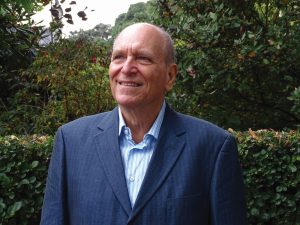
I have been always interested in politics and economics. In my early years, I was mainly interested in history, and the topic of economic history inspired me to become an economist.
Studying economics provides a toolkit of skills, approaches and ways of thinking that can be applied to a wide range of economic and social problems.
My field of economics involves thinking in terms of models and then developing their ability to study complex real-world problems. This is a fascinating procedure and requires some detective work when solving the riddles relating to economic issues. My research applies to important issues relating to the welfare of the population. This partly involves studying the impact of the economy on factors including mental health, job satisfaction and working conditions.
Psychology underpins many of the founding principles of economics, including individuals’ motives, expectations and their reaction to future uncertainties. This collaboration between economists and psychologists has enriched my understanding and knowledge of human psychology.
In my free time I enjoy hillwalking, sailing, motorbiking and gardening. I relax by reading Keynes’ writings and other similar literature, but also classics from Victor Hugo to Fyodor Dostoevsky, and from Epicurus to William Shakespeare.
Meet Nicole

I didn’t know that I wanted to become a psychologist before I started university. I just decided to study psychology because it seemed interesting!
I am a very curious person (nosy, some might say!), so one of my favourite things is finding out the results of my research. I love that my job involves learning new things and that much of my work has implications for others and can make a difference in people’s lives.
I think that I am a better psychologist after working with economists! I had done previous research on financial decision making and on physiological stress, so in many ways this collaboration has finally allowed me to combine my two interests. Working with people outside of your discipline means having to push yourself to learn new things and consider your research from new perspectives.
I loved reading and writing while I was growing up. I thought I was terrible at maths and wanted nothing to do with numbers. Now, I work with numbers every day and I love it!
Meet Julia

When I was younger, I was interested in everything but had no real idea of what I wanted to do. I wanted to be a vet until I realised that I was too soft to deal with animals in pain. I wanted to be a graphic designer until I realised that I wasn’t that great at art. I eventually stumbled across psychology when I read a university brochure that my older brother brought home. I’m naturally inquisitive and like to know why people do what they do, so psychology sounded perfect!
My psychology degree didn’t contain any health psychology. But then, when I met two health psychologists, everything they were working on sounded interesting to me – the links between stress and heart attacks, why different people who’d had identical operations experienced different outcomes, how to support people to change their lifestyle behaviour… I realised I would like to do something with real-world relevance, so I took a chance, applied for a job with them, got it, and have never looked back!
I love that the research I do is really varied and that it is useful in the real world. I’ve worked on projects recently that have ranged from helping to detect skin cancer earlier to improving children’s dental health. No two projects are the same, but they all have results with the potential to make a positive difference in the world.
Working with experts from other fields is always great as you pick up loads of interesting things you would never have come across in your own field. As a psychologist, I know a lot about stress and the impact of different aspects of stress on health. The economists know all about different working practices and payment schemes. By combining our knowledge and interests, we can start to understand why jobs with certain characteristics might be damaging to health and help employers keep their workforces healthy.
Meet Dan

What we do, say and feel can have a profound influence over our own health and wellbeing, and that of others. So, changing behaviour can be a route to improving health, but this is often not easy. It’s crucial to find ways to make healthy behaviours more appealing to everyone and find ways to help people make changes when they want to.
I enjoy exploring how and why our health and wellbeing changes from day-to-day or place-to-place. This usually involves repeated (and relatively intense) observations of participants’ behaviour, physiology and experience over time, often with them wearing devices to record data.
The most enjoyable thing about working in this collaboration is that everyone brings a different perspective. When you only work with people from your own discipline, they will all have been through very similar training routes, so will often come up with similar solutions to problems. At the end of the day, diversity of thought is great.
Psychology is not as old a discipline as some of the other sciences, so if we are honest, there is huge scope for improvement in research methods, theory and applications. We need new psychologists to bring a healthy scepticism, challenge ideas, explore alternatives and propose new ways forward!
THE TEAM’S TOP TIPS
1 Give in to your curiosity! Be guided by whatever sparks a genuine interest in you.
2 It’s okay to not know what you want to do when you finish school. And it is okay to change your mind during your career!
3 At university, speak to your lecturers about their careers and ask if they have opportunities for you to assist with any projects that they have. It’s a great way to try research and gain some experience.
Do you have a question for Keith, Nicole, Julia, Dan or Ioannis?
Write it in the comments box below and Keith, Nicole, Julia, Dan or Ioannis will get back to you. (Remember, researchers are very busy people, so you may have to wait a few days.)


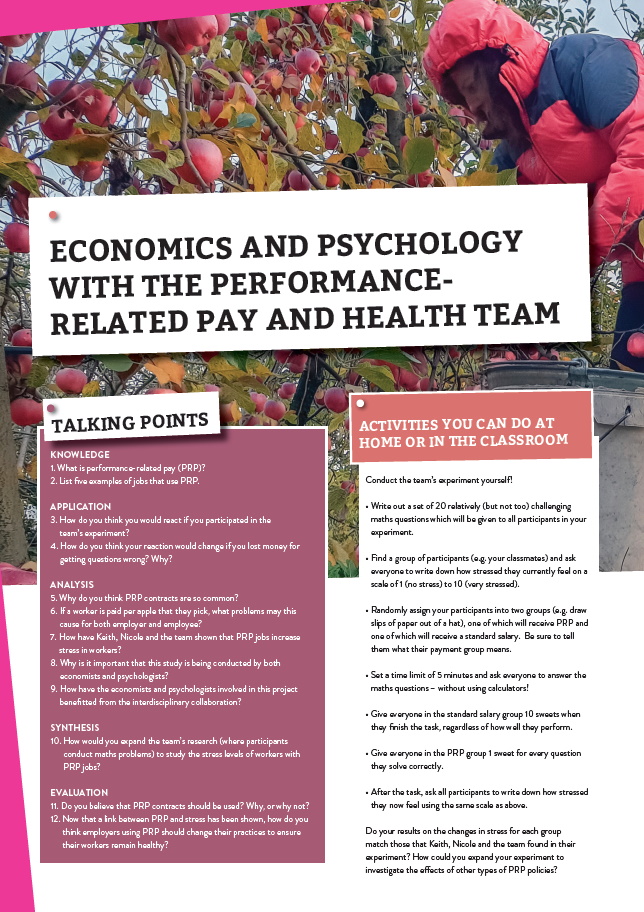
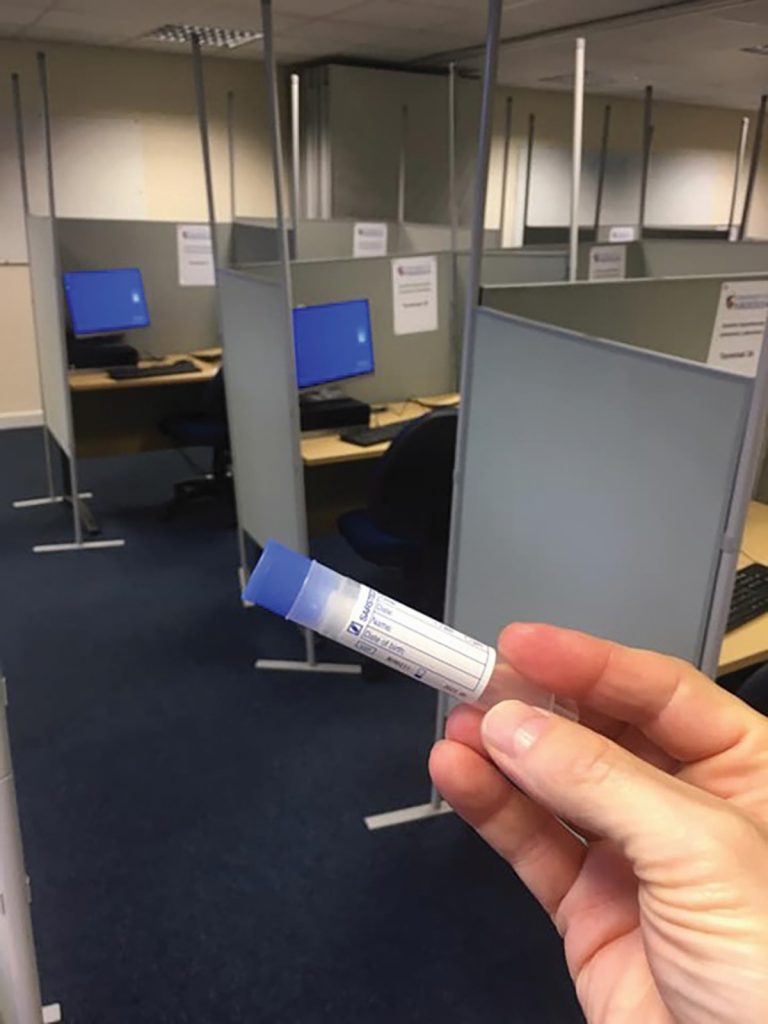
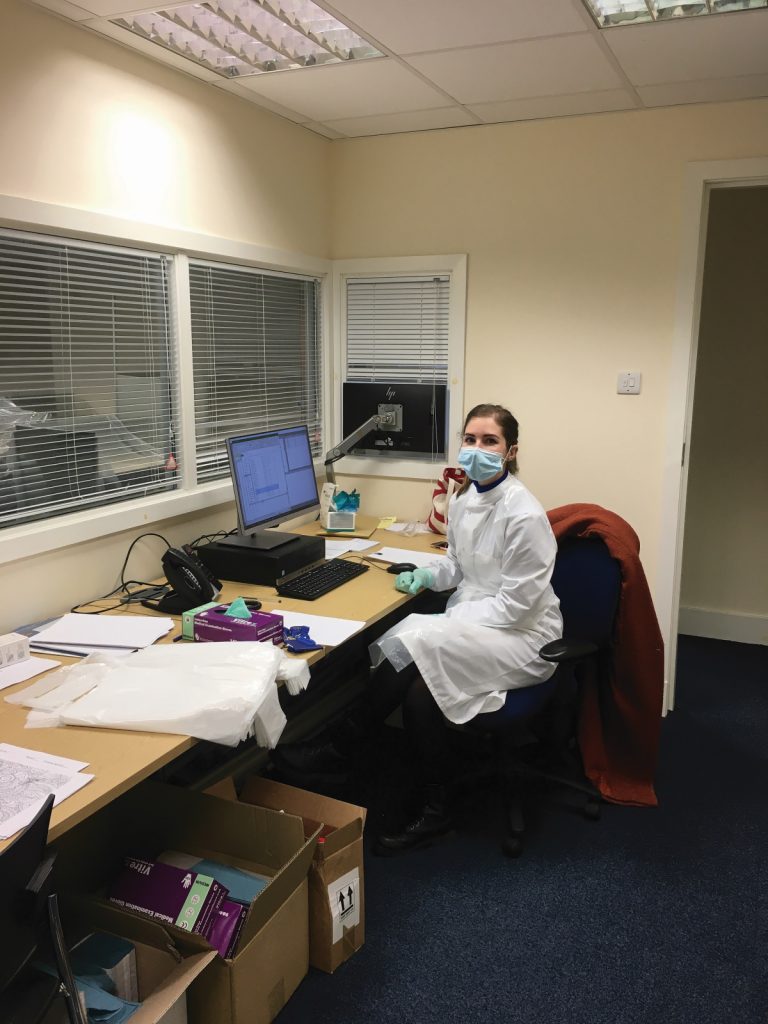
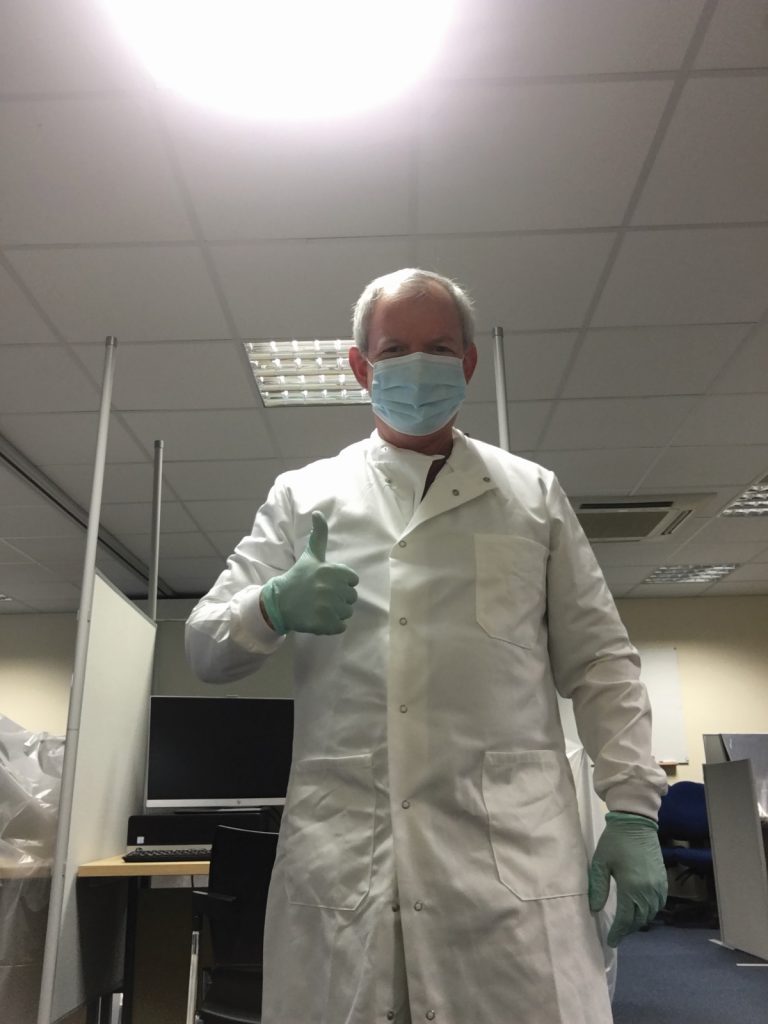

Sir l am very interested to study at business school of Aberdeen.
Dear Mizanur – Thanks for the email. I presume that this is for an undergraduate degree? Probably the best thing is for you to visit the School’s website about our undergraduate degrees:
https://www.abdn.ac.uk/business/courses/undergraduate/index.php
From there you can read about all of our programmes. Clicking on them will take you to the prospectus pages with lots of information about how the degrees are structured as well as application procedures, scholarships, etc. Alternatively, you can email the admissions team directly at: [email protected]. I am sure that they would be happy to help you!
Good luck!
Keith
*****
Keith Bender
SIRE Professor of Economics
University of Aberdeen